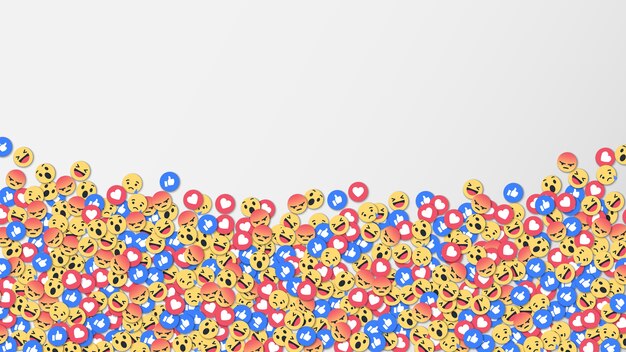The Algorithm Made Me Do It: Social Media and Internet Drama

The Algorithm Made Me Do It: How Social Media Platforms Fuel Internet Drama explores the ways in which algorithms on social media platforms can contribute to online conflicts and intensify existing cultural divisions, impacting user behavior and platform dynamics.
Have you ever wondered why some online arguments seem to spiral out of control? The answer might lie in the algorithms that govern what you see on social media every day. The Algorithm Made Me Do It: How Social Media Platforms Fuel Internet Drama is a look into the dynamics.
Understanding the Algorithm’s Role
Social media algorithms are designed to show users content that they are most likely to engage with. While this can enhance the user experience by providing tailored content, it also has the potential to create echo chambers and filter bubbles.
These echo chambers can amplify existing biases and create an environment where users are less exposed to diverse perspectives. This can lead to increased polarization and make online discussions more contentious.
How Algorithms Shape Content Consumption
Algorithms often prioritize content that elicits strong emotional responses, such as outrage or excitement. This can lead to the spread of sensationalized or misleading information, also known as “fake news,” which can further inflame online tensions.
Additionally, algorithms can reinforce existing social hierarchies and power structures. For example, content from popular or influential users is often given greater visibility, while content from marginalized or less-connected users may be suppressed.
- Algorithms prioritize engagement metrics, such as likes, shares, and comments.
- This can incentivize users to create content that is designed to provoke strong reactions.
- Algorithms can create filter bubbles, where users are only exposed to information that confirms their existing beliefs.
- This can lead to increased polarization and make it more difficult for people to have constructive conversations online.
In conclusion, algorithms play a significant role in shaping the online environment and can contribute to internet drama by amplifying biases, spreading misinformation, and reinforcing existing social hierarchies. Understanding these dynamics is crucial for navigating the complexities of social media.

The Anatomy of Online Drama
Online drama is not a new phenomenon, but social media platforms have provided fertile ground for it to flourish. The anonymity and lack of face-to-face interaction can embolden users to engage in behaviors they might otherwise avoid.
The speed and virality of social media also contribute to the escalation of online conflicts. A single post can quickly spread to thousands or even millions of users, amplifying its impact and making it difficult to contain the fallout.
Common Triggers for Internet Drama
Many different factors can trigger internet drama, from political disagreements to personal attacks. However, some common themes emerge across different online platforms.
One common trigger is the spread of misinformation or disinformation. When users share false or misleading information, it can lead to confusion and anger, particularly if the information touches on sensitive or controversial topics.
- Political polarization and partisan divides.
- Misunderstandings and misinterpretations of online communication.
- Personal attacks and cyberbullying.
- Trolling and deliberately provocative behavior.
Ultimately, online drama is a complex phenomenon with a variety of causes and consequences. By understanding the underlying dynamics, we can work to create a more positive and productive online environment.
The Psychological Impact
Engaging in or witnessing internet drama can have a significant psychological impact on individuals. Studies have shown that exposure to online conflict can lead to increased stress, anxiety, and depression.
The anonymity and impersonal nature of online interactions can also make it easier for people to engage in toxic or abusive behavior. This can have a particularly harmful impact on vulnerable individuals, such as teenagers or people with pre-existing mental health conditions.

Recognizing and Addressing the Effects
It is important to recognize the potential psychological impact of internet drama and take steps to mitigate its effects. This can include limiting exposure to online conflict, practicing self-care, and seeking support from friends, family, or mental health professionals.
Online platforms also have a responsibility to create a safer and more supportive environment for their users. This can include implementing stricter content moderation policies, providing resources for mental health support, and promoting positive online behavior.
- Online drama can lead to feelings of isolation, anger, and helplessness.
- It is important to set boundaries and limit exposure to triggering content.
- Seeking support from trusted friends, family, or mental health professionals can be beneficial.
- Practicing self-care, such as exercise, meditation, or spending time in nature, can help to reduce stress and anxiety.
In sum, the psychological impact of internet drama is real and can be significant. By recognizing the potential effects and taking proactive steps to mitigate them, we can protect ourselves and others from harm.
The Role of Social Media Platforms
Social media platforms have a significant role in shaping the online environment and influencing the level of internet drama. Their algorithms, content moderation policies, and community guidelines can all have a profound impact on user behavior.
Some platforms have been criticized for prioritizing engagement above all else, even if it means allowing toxic or abusive content to flourish. Others have been praised for taking a more proactive approach to content moderation and promoting positive online interactions.
Platform Responsibility and Accountability
Many argue that social media platforms have a moral and ethical responsibility to protect their users from harm. This can include taking steps to combat misinformation, prevent cyberbullying, and promote respectful online discourse.
However, there is also a debate about the extent to which platforms should regulate content. Some argue that excessive content moderation can stifle free speech and limit the ability of users to express themselves.
- Platforms should invest in robust content moderation systems to identify and remove harmful content.
- They should be transparent about their content moderation policies and how they are enforced.
- They should empower users to report abusive or inappropriate behavior.
- They should promote media literacy and critical thinking skills among their users.
Ultimately, finding the right balance between freedom of expression and user safety is a complex challenge. Social media platforms must engage in ongoing dialogue with users, experts, and policymakers to develop policies that are both effective and respectful of fundamental rights.
Strategies for Navigating Internet Drama
While it may not be possible to completely eliminate internet drama, there are strategies that individuals can use to navigate it more effectively. These strategies can help to protect your mental health and promote more positive online interactions.
One important strategy is to be mindful of your own behavior online. Avoid engaging in personal attacks, spreading misinformation, or trolling others. Instead, focus on communicating respectfully and constructively, even when you disagree with someone.
Practical Tips for Handling Conflict
When you encounter online conflict, it is important to remain calm and avoid escalating the situation. Take a step back and assess the situation objectively before responding. Consider whether it is even worth engaging in the conversation at all.
If you do choose to respond, do so thoughtfully and respectfully. Avoid using inflammatory language or making personal attacks. Focus on addressing the issues at hand, rather than trying to win the argument at all costs.
- Set boundaries and limit your exposure to online conflict.
- Don’t feed the trolls – avoid responding to deliberately provocative or abusive comments.
- Report abusive behavior to the platform’s moderators.
- Remember that not every argument needs to be won. Sometimes it is best to simply disengage.
In conclusion, navigating internet drama requires a combination of self-awareness, emotional intelligence, and practical strategies. By being mindful of your own behavior and following these tips, you can create a more positive and productive online experience for yourself and others.
Promoting Positive Online Interactions
In addition to mitigating the negative effects of internet drama, it is also important to promote positive online interactions. This can help to create a more supportive and inclusive online environment for everyone.
One way to promote positive interactions is to focus on building relationships and fostering a sense of community. This can involve joining online groups or forums that share your interests, participating in constructive discussions, and offering support to others.
Building a Healthier Online Community
Another important step is to promote media literacy and critical thinking skills. This can help people to better evaluate the information they encounter online and avoid falling victim to misinformation or disinformation.
Ultimately, creating a healthier online community requires a collective effort. Individuals, platforms, and policymakers all have a role to play in promoting positive online interactions and combating internet drama.
- Be respectful of others, even when you disagree with them.
- Offer support and encouragement to others.
- Share positive and uplifting content.
- Report abusive or inappropriate behavior.
To summarize, by focusing on building relationships, promoting media literacy, and taking collective action, we can create a more positive and productive online environment for everyone.
| Key Point | Brief Description |
|---|---|
| 🔥 Algorithm Amplification | Algorithms prioritize engaging content, often intensifying drama. |
| 🎭 Anonymity & Disinhibition | Online anonymity can lead to disinhibited and aggressive behavior. |
| 🧠 Psychological Impact | Exposure to online drama can cause stress, anxiety, and depression. |
| 🛡️ Strategies to Cope | Setting boundaries, disengaging, and seeking support can help manage online drama. |
[Frequently Asked Questions]
How do social media algorithms contribute to online drama?
▼
Social media algorithms prioritize content that is likely to generate engagement, which can include sensationalized or inflammatory posts. This can amplify existing biases and create echo chambers, fueling online drama.
▼
Social media algorithms prioritize content that is likely to generate engagement, which can include sensationalized or inflammatory posts. This can amplify existing biases and create echo chambers, fueling online drama.
▼
Common triggers include political polarization, misinformation, personal attacks, and trolling. These factors can create a hostile online environment and lead to heated arguments and conflicts.
▼
Exposure to online conflict can lead to increased stress, anxiety, and depression. The anonymity of the internet can also embolden toxic behavior, which can be particularly harmful to vulnerable individuals.
▼
Social media platforms set the stage via algorithms, content moderation, and community guidelines, which can greatly impact user behavior. Their policies either escalate or mitigate online conflict, significantly affecting the user experience.
▼
Individuals can set boundaries, limit exposure to online conflict, avoid engaging with trolls, and report abusive behavior. Practicing self-care and seeking support from trusted sources can also be beneficial.
Conclusion
In conclusion, the algorithm made me do it: how social media platforms fuel internet drama is a multifaceted issue that requires a holistic approach. By understanding the role of algorithms, recognizing the triggers for online conflict, and implementing strategies for navigating drama, we can create a more positive and productive online environment.






